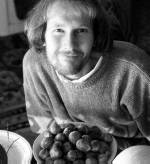
March 13, 1998
Healthy life in the raw - Vegetarianism is branching out in
another direction, writes Liz Gill

Diet is no laughing matter for comedy writer
John Machin, who only eats monomeals
Photograph: MICHAEL POWELL
Two-year-old Lucy has never tasted cooked food. Even on Sundays when millions will be
sitting down to a traditional roast lunch, Lucy and her parents will be tucking into a
plate of raw vegetables. Kevin and Robin Webster are fruitarians, a small but growing band
of people who not only eschew meat and animal products but insist all food is eaten raw.
Australian-born Mr Webster, 33, became a fruitarian eight years ago after developing
joint pains. "The doctors told me arthritis was inevitable and there was nothing they
could do. I was only in my early twenties and I felt I was going down the tubes. I had to
look for an answer elsewhere."
So he swapped his "traditional Australian diet of meat and starch" for one
that consists mainly of "fruit with some leafy vegetables and nuts, and now feels
fine.
"We believe in instinctive nutrition," he says. "As long as food is
naturally produced, we can trust our senses about what we need. If food is altered,
though, not just by cooking or chemicals but even by things we take for granted like heavy
composting, then we can no longer trust our senses because things taste good beyond our
need for them."
According to a recent study at Giessen University in Germany, Kevin is a typical raw
fooder, an umbrella term given to people who eat food raw including, sometimes, raw meat.
Of the 865 raw fooders studied, the most extreme were young, male and followed the regime
for health reasons.
"But it's not a diet I'd recommend long-term," says nutritional scientist
Carola Strassner, who helped conduct the survey. "According to our research, about a
third of the participants were underweight; women who adhered to the stricter forms found
that their menstruation became infrequent or stopped altogether. They lacked nutrients
including vitamin D and B12.
"There are also the practical problems. For example, what raw food can be found in
a northern climate in the winter. You have to import it, which causes all kinds of
ecological problems."
Susie Miller, who runs the Fresh Fruit Network, disagrees. "The trouble with the
survey," she says, "is that most of the participants have only been raw fooders
for a short time, and many are unhealthy in the first place. It then takes its benchmarks
from the majority of a healthy population who eat cooked food. We are the only species who
does this."
She then refers to a series of trials done on 900 cats by the American physician
Francis Pottenger, who found that the cats fed on raw food were not only much healthier
than their cooked-food fellows, but so were their offspring. Indeed, Pottenger's raw food
clinics became well-known, as did his raw vegetable juices. He even had a raw liver
"cocktail" which, though admired for its curative properties, according to his
patients tasted revolting.
But then some tastes take a bit of getting used to. On special occasions like Easter,
Mr Webster will splash out on a durian, a fruit with so spiky an exterior it has to be
handled with gloves.
"To conventional western tastes it does have an offensive smell," he says.
"But once you've tried it your concept of smell changes."
Agrowing branch of the raw food movement is sproutarianism - whose adherents eat mainly
sprouted pulses and grains. "In hot places you can be 100 per cent fruitarian,"
says Karen Noble, who recently launched the Fruit and Raw Food Centre in Spitalfields,
London, "because native foods are available all the year round. But you have to be
sensible and eat the food that's available where you are. And in a cold climate seeds and
grains and pulses are what we have. Sprouting makes them edible without cooking. You just
soak them for two to three days."
Her menu would be too much of a mixture for John Machin, a comedy writer for Noel's
House Party, whose Sunday fare will consist of four monomeals: a melon for breakfast,
coconut for lunch, a pound of Brussels sprouts for afternoon tea, and three mangoes for
supper. "The stomach digests better," he says, "if there's only one thing
to deal with. And your tastes are not interfered with."
Forms of vegetarianism
A RECENT survey claims that one in six people are vegetarian or considering it. But
many follow even stricter diets:
- Lacto-ovo-vegetarian: eats dairy products and eggs. They are the most common type.
- Lacto-vegetarian: eats dairy products but not eggs.
- Ovo-vegetarian: eats eggs but not dairy products.
- Vegan: no dairy products, eggs, or any other animal products.
- Fruitarian: eats mainly raw fruit, grains and nuts.
- Macrobiotic: eats a vegan diet but includes seafoods.
- Raw foodist: eats a vegan diet but no cooked or processed foods.
Vegetarian and Vegan Society: 0161-928 0793; Fresh Food Network: for details send a sae
to PO Box 7, South Brent, Devon TQ10 9YN. |
